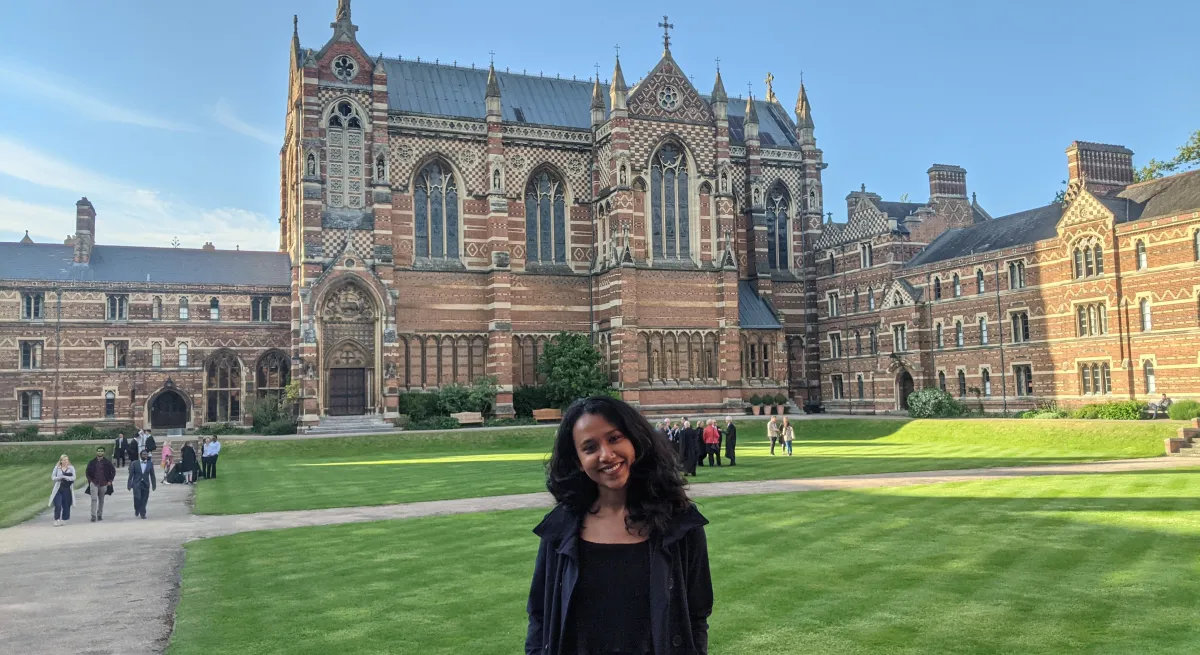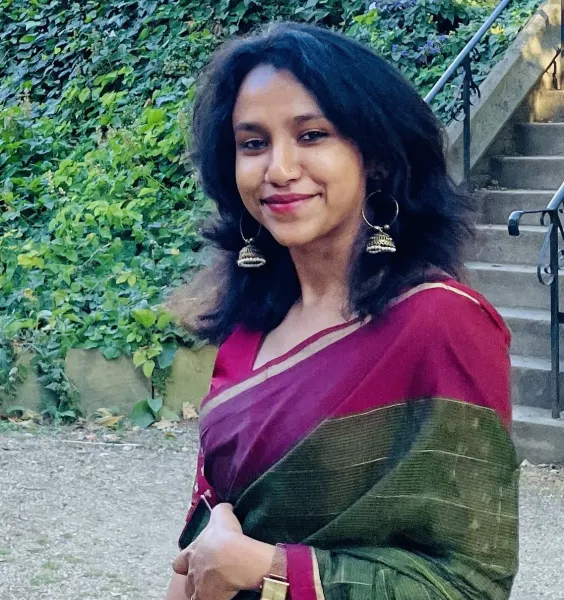Access to quality education plays a significant role in overcoming the barriers to income and opportunity caused by wealth inequality. Access to elite education even more so: Education at a prestigious institution can significantly enhance social mobility by providing access to unparalleled resources, networks, and opportunities that may otherwise be out of reach. Julius Baer, together with the Weidenfeld-Hoffmann Trust, supports postgraduate scholars from developing and emerging countries to pursue fully-funded graduate studies at the University of Oxford alongside a comprehensive programme of leadership development, long-term mentoring and networking. The ultimate objective: Empowering future leaders to create impact and opportunity for their communities and countries.
This series of articles by programme alumni aims to share their views and insights on their experience and how the knowledge and experience they gained at Oxford and beyond has influenced their own world views and equipped them to affect positive change in the social, political or economic development of their community or country.

I grew up in a family of working women, many of whom were teachers or aspired to be. I was also taught by exceptional teachers who committed wholeheartedly to their profession, often giving far more than they received in return. My mother regularly spoke passionately about her dream of having a job that supported and uplifted those around her. Unlike my own circumstances, the lives of women around me were marked by many challenges – limited resources, difficult living conditions and an absence of support systems or safety nets. Education was their pathway to a better life, a fact they would remind me of repeatedly. These women, their commitment to success and their passion for service shaped much of my childhood.
I always knew I wanted to pursue a profession with social purpose at its core. As my skills and sensibilities naturally aligned with the social sciences, I chose a non-STEM path. My family and teachers did everything they could to dissuade me – they cautioned, panicked, bribed and even tried reasoning with me! At the time, none of us had a clear sense of the career opportunities a social sciences education could provide – not even me. There was also a prevailing belief that a stable and lucrative career was only possible in fields like technology, engineering, or medicine. I had to pretend I knew where I was headed, but in truth, I did not. The journey that followed was defined by persistence, hard work, and intention but also self-doubt, fear and hesitation.
Preparing for a profession with purpose
I completed my first Master’s degree in Development Studies from the prestigious Indian Institute of Technology in Chennai, a vibrant city in southern India. As a teenager struggling to make sense of the world, I found the interdisciplinary framework offered by the Development Studies programme both compelling and empowering. During the early years of my 5-year Master’s programme, I immersed myself in various extracurricular social service initiatives. I was actively involved in the National Social Service (NSS) scheme and an initiative called IIT for Villages (iViL). Through iViL, volunteers brought their ideas to life, working to improve the quality of life in specific rural communities. This gave me my first glimpse into informed and genuine grassroots change. I was also deeply inspired by the sense of community and solidarity underpinning this work. Of course, it was not perfect - after all, we were just a group of eighteen-year-olds trying to navigate and understand the world around us. Nonetheless, this experience reinforced my resolve to build a career centred on helping others and improving lives.
I wanted my education to pave the way for opportunities in a field that resonated with my values and vision of meaningful, day-to-day work.
During my brief stint at the Deshpande Foundation, a social enterprise based in India, I began to truly understand the complexities of driving meaningful social change. The gap between theory and practice became starkly evident – almost epiphanic. I worked with the K-12 education team at the Foundation, initially supporting and eventually leading the development of a language and life skills programme for hundreds of government schools in rural North Karnataka. The randomness and triviality of the problems we grappled with daily – both on an individual and organisational level – stood in stark contrast to the sweeping, systemic significance of the issues outlined in our polished PowerPoint presentations. It was here that I first came to understand the nuances and intricacies of true social impact: the systemic nature of it – how, for example, female education influenced maternal and child health outcomes; the dailiness of it - how schools were not just institutions but integral to the day-to-day realities of the communities they served; and the joy of it-how I discovered that the first task of a researcher is to listen and observe, then to study and understand. The intrigue I developed here for the science and philosophy of education ultimately inspired me to pursue a degree in the field.
The journey continues to the University of Oxford
I was acutely aware of where I stood in life, what I wanted to achieve, and the many factors I had to consider – family, finances, migration and the future. I wanted my education to pave the way for opportunities in a field that resonated with my values and vision of meaningful, day-to-day work. A career in the third sector felt like the perfect fit. This clarity also guided my decisions regarding the university, course and programme I chose. I’ve written more about this journey on my blog.
Receiving an offer from the University of Oxford to study for a Master’s degree in Comparative and International Education was just the first milestone; many more steps and challenges awaited, particularly for our cohort, as this was in 2021, with COVID-19 still governing every aspect of our lives. I was mentally prepared to apply for a loan if scholarships did not come through. However, I must acknowledge the privilege of having a supportive pastoral and financial ecosystem that could have made this possible. The day I received the Oxford-Weidenfeld and Hoffmann-Sackler, Julius Baer Scholarship offer letter is one I’ll never forget. Seeing my father’s slightly teary eyes and proud face as he heard the news is a memory that will always stay with me.
The scholarship opened up so many possibilities, but the greatest gift it gave me was time. By addressing the financial worries of studying and living in a new country during a cost-of-living crisis, the scholarship allowed me to fully immerse myself in the experience – academic, social, and cultural aspects of studying at a phenomenal institution like Oxford. Beyond the financial support, the scholarship’s formal and informal networks, along with its focused sessions on moral philosophy, leadership and entrepreneurship as part of its leadership programme, made it truly one of a kind. It also gave me some of my closest friends from Oxford – extraordinary individuals excelling in their fields, with whom I can passionately debate the world's rights, wrongs and future.
The scholarship allowed me to fully immerse myself in the experience – academic, social, and cultural aspects of studying at a phenomenal institution like Oxford.
Oxford itself was a constant source of intellectual stimulation, with its wealth of people and ideas from around the globe. Academic courses and scholarship sessions introduced us to stories and case studies from diverse contexts, further enriched by the varied perspectives and lived experiences of my peers. With the abundance of resources – libraries, seminars, talks, lectures and student-led activities there was never a dull moment. However, as exciting as these opportunities were, they felt overwhelming in a new context. I found it invaluable that the scholarship was thoughtfully structured to offer consistent pastoral support to help students navigate this happening yet demanding environment.
The city of Oxford is itself breathtakingly beautiful, steeped in history and culture, and with no shortage of things to do or discover. After three years here, I’ve found my own rhythm. Whether attending networking events, book readings, or talks by world-renowned personalities, I feel profoundly grateful to be in an environment that constantly challenges and inspires me.
A passion to drive positive outcomes
I have not had my fill of Oxford just yet; I still live here and work with ImpactEd Evaluation, a social enterprise dedicated to helping education and social-purpose organisations measure and maximise their impact. In my role, I primarily support social development and youth services organisations across the UK, helping their programmes better serve vulnerable and marginalised young populations. This year, I’ll also be taking on independent consulting projects, including offering pro-bono research and communication support to educational organisations from the Global South. Having worked with diverse organisations and educational initiatives in both India and the UK, I’m excited to contribute more to this space - kicking off projects in India first with the aspiration of eventually supporting teams and projects in other regions.
Wherever I go and whatever I do, my goal is to live by these words every day and never lose sight of the bigger picture. Toni Morrison said in a 2003 interview,
“I tell my students, 'When you get these jobs that you have been so brilliantly trained for, just remember that your real job is that if you are free, you need to free somebody else. If you have some power, then your job is to empower somebody else. This is not just a grab-bag candy game.”

Deepta is a seasoned education professional with expertise in non-profit management. Her diverse experience spans working with state schools in rural India and evaluating initiatives by educational and social-purpose organisations in the UK. Passionate about translating educational theory into effective practice, Deepta helps organisations develop impactful, innovative, and inclusive solutions that drive positive outcomes for children and young people, especially those from marginalised backgrounds. Deepta holds an MSc in Comparative and International Education from the University of Oxford and an MA in Development Studies from the Indian Institute of Technology Madras. Deepta is a Manager at ImpactEd, where she leads various evaluation partnerships primarily focused on education, social development and youth services. She is currently based in Oxford, UK.
